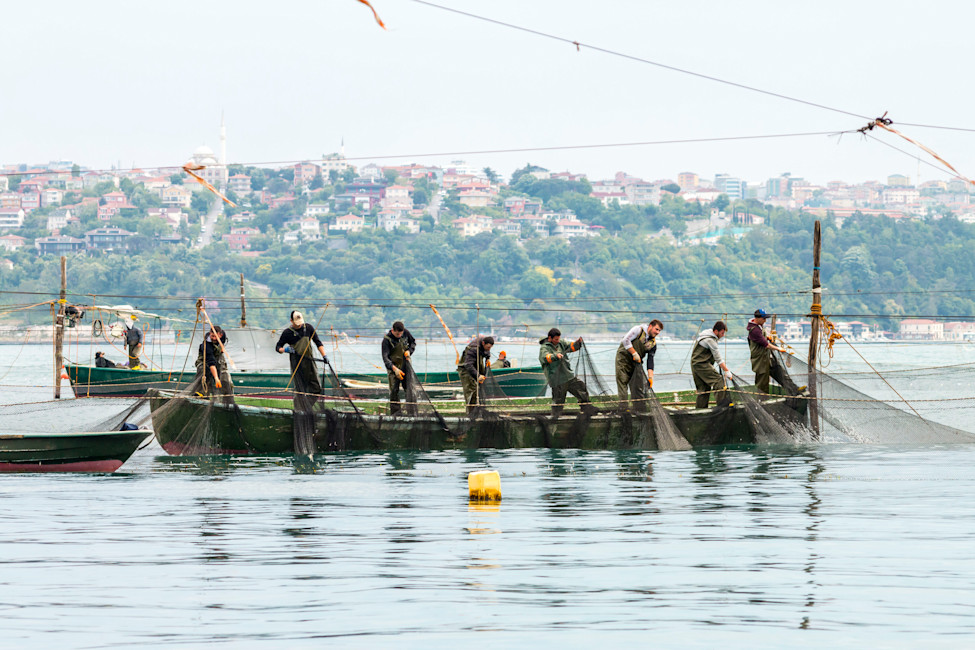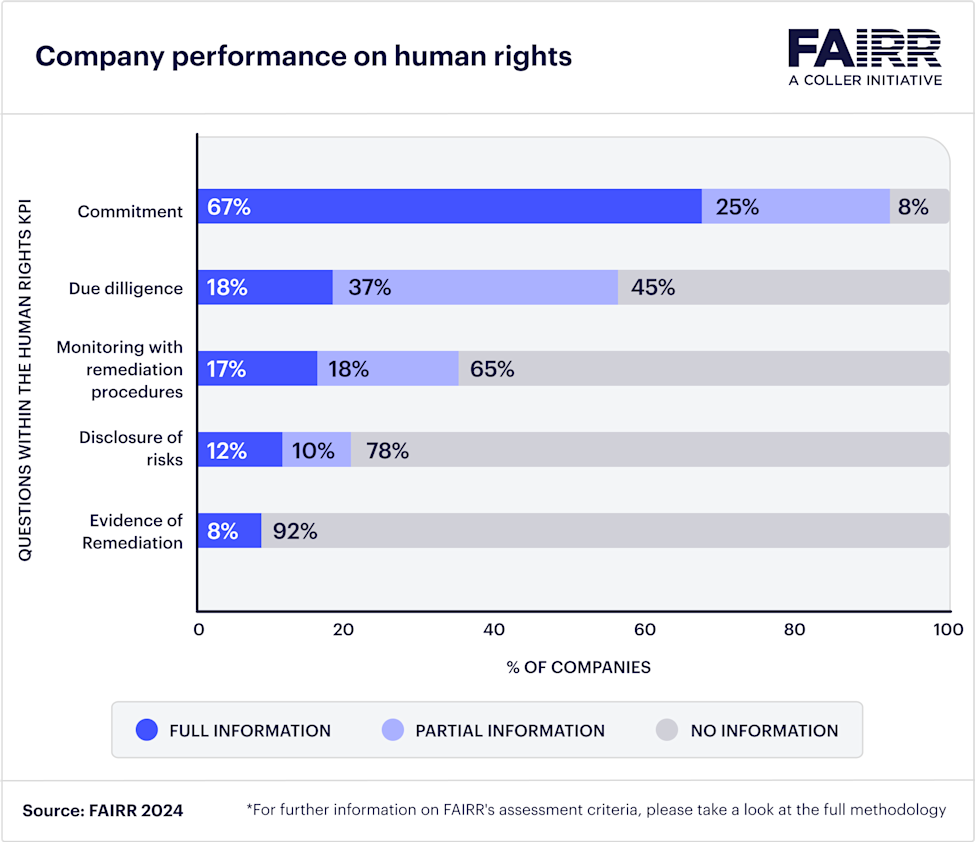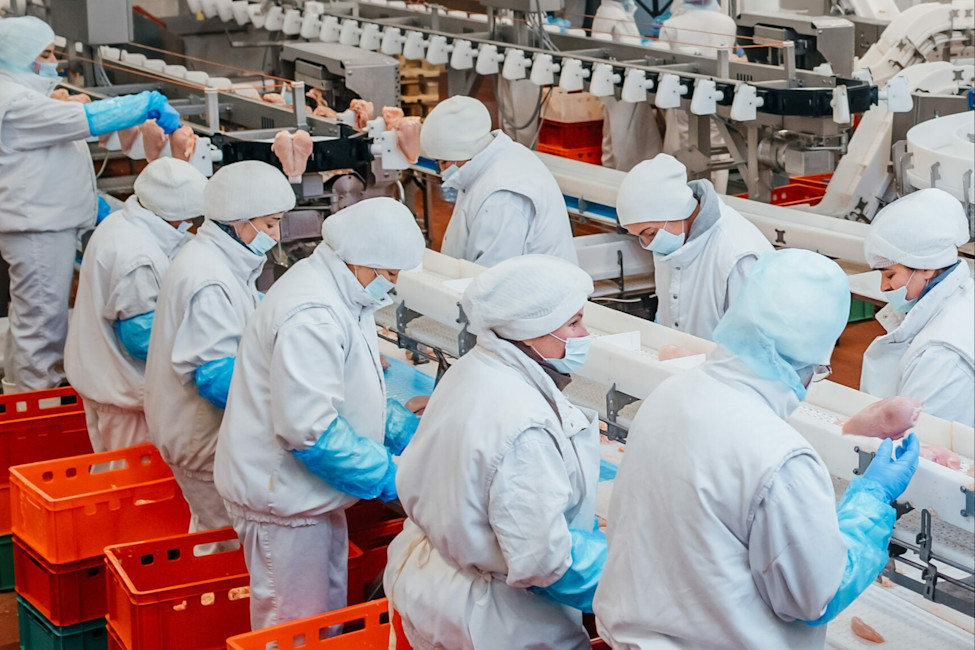2024 Protein Producer Index
Key social risk findings
The sector has come a long way on social risk since 2019, when this factor was first analysed. The number of companies classified as high risk on social issues has decreased from 32 to 12, now representing just 20% of the total Index.
That said, companies are significantly more likely to be categorised as high risk on human rights-related questions compared to fair working conditions, health and safety and freedom of association, with 50% of the 60 Index companies still deemed high risk on the issue.
While protein producers generally have a strong commitment to respecting human rights, they are failing to translate their pledges into strong practices to find and address risks.
The findings below showcase the progress made by Index companies in mitigating human rights risks, while highlighting that sector-wide improvements are needed to tackle long-standing issues in the industry.
33%
drop in profits, defined as earnings before interest and taxes (EBIT), for European red meat processors between 2017 and 2020 due to labour factors[1].2.2 million
people in the agriculture and fishing sectors suffer from modern slavery, representing 13% of all forced labour victims[2].20%
companies classified as high risk on social issues, down from 53% in 2019.2
companies have achieved a best practice rating on social risks for the first time since 2019.65%
of companies do not disclose any human rights monitoring or procedures on how they tackle human rights violations.8%
of companies disclose taking remediating actions in response to human rights risks.Commitments to upholding human rights are strong
Protein producers generally have a strong commitment to respect all internationally recognised human rights, such as those included in the Universal Declaration of Human Rights and the core International Labour Organization Conventions, with comprehensive policies covering all operations.3,4
In 2024, 67% of companies have such a commitment, up from 23% in 2019, when this criterion was first analysed. A commitment to uphold human rights serves as a basis for ensuring that these are respected across a company’s operations.

Protein producers are failing to translate commitments into strong practices
Only 18% of companies disclose having a strong human rights due diligence process, comprising stages including risk mapping and stakeholder consultation, covering internal operations and supply chains.
Similarly, only 17% disclose regular monitoring of human rights risks across the value chain along with how they approach identified risks, with almost two-thirds not doing so.
The prevalence of human rights issues in animal agriculture makes due diligence a vital component of companies’ risk identification and mitigation strategies. The sector is highly labour-intensive and relies on vulnerable workers operating in hazardous environments on low incomes.5
These factors expose the sector to a high prevalence of issues such as modern slavery, child labour, physical harm and discrimination. Indeed, the ILO estimates that 13% of all modern slavery victims are found in the agriculture and fishing sectors, representing a disproportionate level of risk, given agriculture only accounts for 4% of global GDP.6,7
The severity of these issues makes them highly material for companies, exposing them to criminal liability, fines, operational risk and reputation damage when they do not have systems in place to assess, monitor and remediate.

Risk and remediation disclosure is limited
Disclosure of actual human rights risks is limited, indicating that companies are either choosing not to report these or that their current due diligence systems are insufficient for identifying such risks. Just 12% of companies report risks found, along with details on the nature and location of risks.
This highlights a pressing need for companies to increase their transparency or invest resources in establishing effective due diligence and monitoring systems.
The biggest room for improvement is seen in taking remediating actions, with just 8% of companies disclosing evidence of remediation in response to human rights risks.
One European dairy company provides a positive example of remediating identified risks. In 2023, SMETA audits highlighted 452 human rights- and labour compliance-related risks in its supply chain, including six relating to forced labour and recruitment fees, three relating to child labour and five concerning discrimination.
By 2024, in response to forced labour risk, the company had reimbursed workers in three cases and was monitoring the remediation of the remaining three, according to its reports. While it could still improve its disclosure on remediating other issues, this approach serves as a leading example among Index companies.

Europe and LATAM lead the way on human rights practices
European and Latin American companies fare better than their peers at managing human rights issues, with only 17% and 25% respectively considered high risk. In Europe, this performance is likely driven by legislation in countries such as France, Germany, the UK and Norway, which mandates that companies report actions they are taking to mitigate human rights and modern slavery risks.8, 9
In LATAM, Brazil is proposing to make human rights due diligence mandatory through its Bill 572.10 It also has a “dirty list” – the Lista Suja – of companies found guilty of forced labour and denies them access to public (and in some cases, private) capital.11 Other countries, including Chile, Argentina and Colombia, promote human rights due diligence through their national action plans.12, 13, 14
In contrast, North American and Asian companies perform poorly, with 57% and 68% of companies rated as high risk, respectively. This is concerning, given the known issues in these regions, such as the rise of child labour in the US and the prevalence of human trafficking and modern slavery in Asia.15, 16

References
[1] Eurostat, (2021). Eurostat Agriculture Database.
[2] ILO, (2022). Global Estimates of Modern Slavery: Forced Labour and Forced Marriage.
[3] UN, (2024) Universal Declaration of Human Rights.
[5] FAIRR, (2021). Unpacking Labour Risk in Global Meat Supply Chains: Phase 1.
[6] ILO, (2022). Global Estimates of Modern Slavery: Forced Labour and Forced Marriage.
[8] Business & Human Rights, (2024). Mandatory due diligence.
[9] Gov.uk, (2024). Modern Slavery Act 2015.
[10] Business and human rights in law, (2022) Brazil Draft Bill Proposal n. 572, 2022.
[12] National Action Plans on Business and Human Rights, (2024). Chile.
[13] National Action Plans on Business and Human Rights, (2024). Colombia.
[14] National Action Plans on Business and Human Rights, (2024). Argentina.
[15] FAIRR, (2023). The Rise of Child Labour in US Meatpacking.
[16] Walk Free, (2023). Global Slavery Index / Regional Findings: Modern Slavery in Asia and the Pacific.